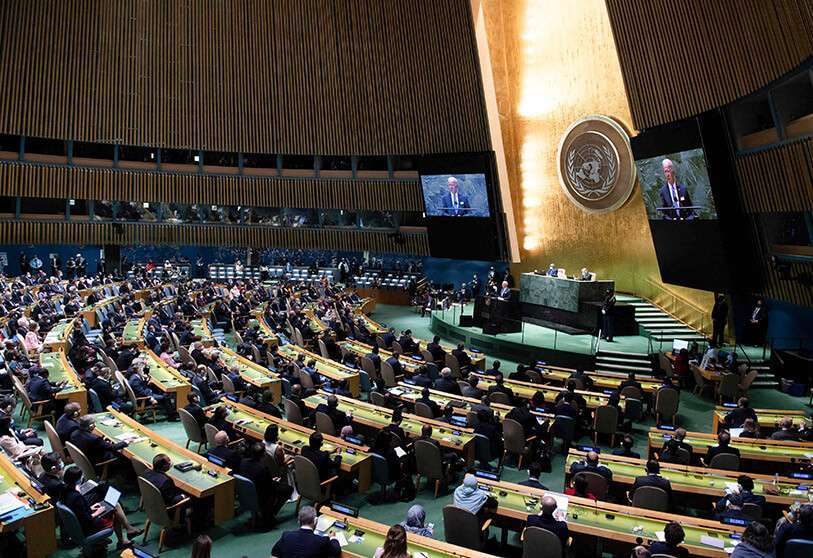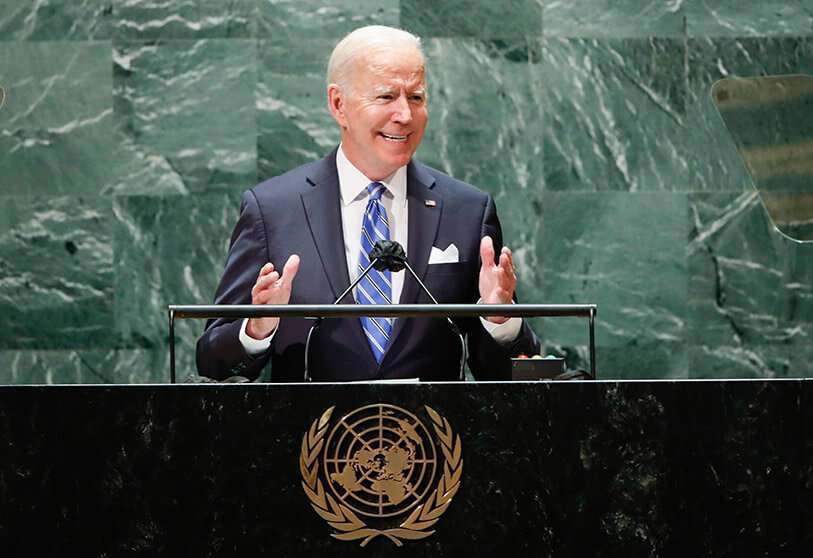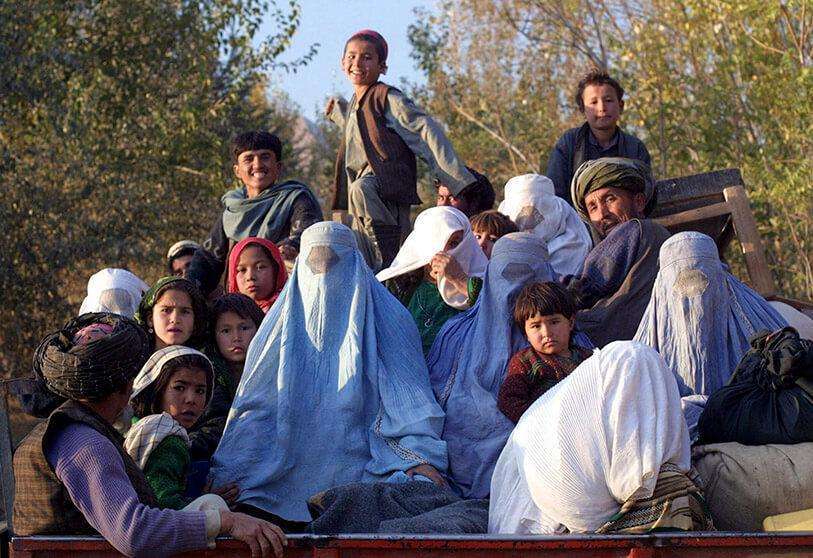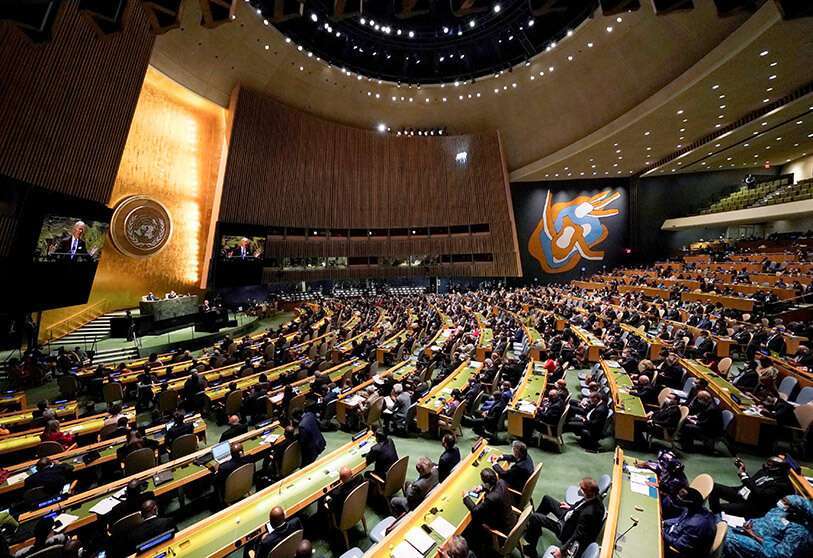UN Assembly: Multilateralism as a lifeline in a divided world

The UN General Assembly has welcomed the world's top leaders in order to provide solutions to the fundamental challenges facing the world. In view of the effectiveness of vaccines, it seems that we are gradually leaving behind the concerns that international society harboured over the COVID-19 pandemic to give way once again to the battle of powers.
In the current world order, in which we are witnessing the strategies of China and its allies to continue to gain a presence in geopolitically important parts of the world while the United States decides to change the course of its foreign policy in favour of a less interventionist policy, countries are occupying new positions.

In recent years we have witnessed China's power rise to become a major geopolitical player, in contrast to the United States. East and West were once again at loggerheads, with the winner vying, as so often before, to be the world's greatest influence.
However, this assertion has been the main hypothesis from which Biden has sought to disassociate himself. In his first speech, the US president defended his "vigorous competition" with China, but affirmed that "we are not seeking a new Cold War, nor a world divided into rigid blocs, but the US will oppose any attempt by powerful countries to dominate weaker ones".
Biden thus pays homage to multilateralism in the face of the concern expressed by UN Secretary General Antonio Guterres, who in his speech made clear that "the world has never been more threatened or more divided (...) I fear that we are sliding into two different sets of economic factors, trade, financial and technological rules, two divergent approaches to the development of artificial intelligence and, ultimately, two military and geopolitical strategies. A recipe for a conflict far less predictable than the Cold War". "We need dialogue, we need understanding," he said.

This unpredictability was recently highlighted by the signing of the AUKUS agreement, a military and security agreement between Australia, the United Kingdom and the United States that was reportedly kept secret until its official announcement. The first consequences of the agreement could already be glimpsed with France's anger following the recall of its ambassadors to Australia and the United States for consultations, as well as its "distrust" of its allies after the signing of the agreement.
In the same vein, Biden continued his speech by underlining the new US strategy: "The US will use multilateral institutions to manage challenges such as those in the Indo-Pacific region" and "will not use force except as a last resort". This statement coincides with the latest US operation, before the withdrawal of its troops in Afghanistan, in which it was announced that 10 civilians, including seven children, were killed "in a tragic mistake" in a US-led drone strike in a counter-terrorism operation.

Almost a month later, the United States ended its presence in the Afghan war by withdrawing its military troops from Afghan soil. This withdrawal, together with the Afghan army's inaction, led to a Blitzkrieg by the Taliban, who were able to seize power in less than a month after the fall of Kabul.
With the Taliban takeover, international concern about new terrorist threats has continued to grow. In this regard, three days before the US withdrawal, ISIS-K perpetrated a series of attacks in the vicinity of Kabul airport, leaving hundreds dead and wounded. However, these attacks did not change the US course as the withdrawal of international troops accelerated.
Afghanistan is now pitted against the Taliban and Daesh terrorists, insurgent groups that dispute the leadership of jihadism in the country. It is important to note that the Taliban are in close contact with Al-Qaeda, the terrorist group that carried out the 9/11 attacks and as a consequence provoked the US intervention in Afghanistan in the "fight against terrorism", an operation that lasted 20 years and cost the United States millions of dollars, as well as a significant human cost in terms of civilians.

Biden affirmed that the United States is "much better prepared" to respond to terrorism and pointed out that "terrorism is real and it is everywhere". He also called on the Taliban to respect human rights and defended the role of women in Afghan society for their importance "in contributing to society at all levels" in the face of Taliban oppression.
The US counter-terrorism mission in Afghanistan leaves the country harbouring new terrorist threats as new groups threaten to wreak havoc in a country with no structured direction and far from a democratic system.
In his speech, Biden also addressed the Israeli-Palestinian conflict, saying he believed that "a two-state solution is the best way to ensure Israel's future as a democratic Jewish state, living in peace alongside a viable, sovereign and democratic Palestinian state". Recall that the former Trump administration recognised Jerusalem, the holy city of the three monotheistic religions, as the capital of Israel, a move that again deepened the Palestinian-Israeli wound and reduced the chances of achieving a peace process.

Meanwhile, last May, Israel and Hamas again staged new clashes that highlighted Israel's powerful military arsenal after demonstrating its defensive effectiveness with the "iron shield" against the missiles Hamas has at its disposal. However, the military inequality between the two factions is notorious in a conflict that, as Biden pointed out, is far from finding a peaceful solution.
Biden has also declared before the UN his commitment to prevent Iran from acquiring an atomic bomb. The president insisted on bringing back the agreement reached with Tehran in 2015 and finalised in 2018, following Trump's withdrawal from the deal.

"The United States remains committed to preventing Iran from obtaining a nuclear weapon..... We are prepared to return to full compliance with the agreement if Iran does the same," Biden said. He added that the US is "working" with China, Russia, France, Britain and Germany to "engage Iran diplomatically and seek to return to the nuclear deal," known as the Joint Comprehensive Plan of Action.
Finally, Biden reaffirmed his commitment to the fight against climate change, saying that the US will double its financial commitment to economic and health aid. According to Biden, extreme heat is the leading cause of climate-related deaths in the United States: "We will not leave Americans to face this challenge alone," he said.

This statement coincided with extreme heat waves in the country last June that left hundreds of dead in the states of Oregon and Washington, as well as the Canadian region of British Columbia. For scientists, these high temperatures were directly related to human action.
In the same way, in his speech he announced that he will invest 10 billion dollars to fight hunger in a fight that in recent decades has made significant progress, reducing chronic malnutrition by 40% since 1990, but in which nearly 2,800,000 children continue to die each year, according to UNICEF.









